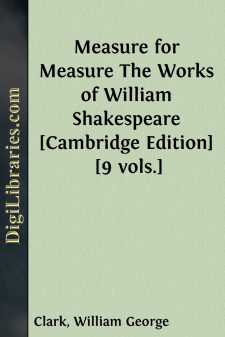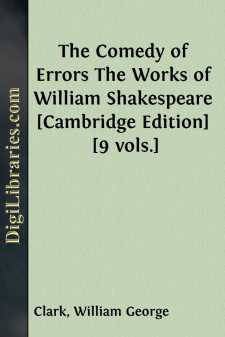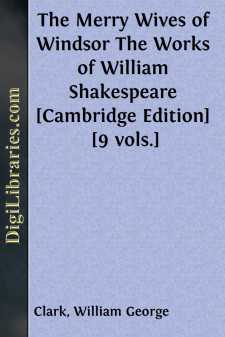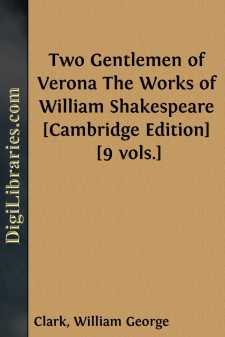Categories
- Antiques & Collectibles 13
- Architecture 36
- Art 48
- Bibles 22
- Biography & Autobiography 813
- Body, Mind & Spirit 142
- Business & Economics 28
- Children's Books 17
- Children's Fiction 14
- Computers 4
- Cooking 94
- Crafts & Hobbies 4
- Drama 346
- Education 46
- Family & Relationships 57
- Fiction 11829
- Games 19
- Gardening 17
- Health & Fitness 34
- History 1377
- House & Home 1
- Humor 147
- Juvenile Fiction 1873
- Juvenile Nonfiction 202
- Language Arts & Disciplines 88
- Law 16
- Literary Collections 686
- Literary Criticism 179
- Mathematics 13
- Medical 41
- Music 40
- Nature 179
- Non-Classifiable 1768
- Performing Arts 7
- Periodicals 1453
- Philosophy 64
- Photography 2
- Poetry 896
- Political Science 203
- Psychology 42
- Reference 154
- Religion 513
- Science 126
- Self-Help 84
- Social Science 81
- Sports & Recreation 34
- Study Aids 3
- Technology & Engineering 59
- Transportation 23
- Travel 463
- True Crime 29
William George Clark
William George Clark (1821-1878) was an English scholar and literary figure renowned for his work as a Shakespearean editor and critic. He co-edited the "Cambridge Shakespeare," a landmark edition of Shakespeare's complete works, which significantly influenced subsequent Shakespearean scholarship. Clark also served as the Public Orator at the University of Cambridge and authored several travel books documenting his journeys through Europe and the Mediterranean.
Author's Books:
Sort by:
MEASURE FOR MEASURE. ACT I. I. 1 Scene I. An apartment in the Duke’s palace. Enter Duke, Escalus, . Duke. Escalus. Escal. My lord. Duke. Of government the properties to unfold, Would seem in me to affect speech and discourse; 5 Since I am to know that your own science Exceeds, in that, the lists of all advice My strength can give you: then no more . . . . . . . . . . . . . . . . . . . . as your worth...
more...
ACT I. I. 1 Scene I. Enter Duke, , Gaoler, , and other Attendants. Æge. Proceed, , to procure my fall, And by the doom of death end woes and all. Duke. Merchant of Syracusa, plead no more; I am not partial to infringe our laws: The enmity and discord which of late 5 Sprung from the rancorous outrage of your duke To merchants, our well-dealing countrymen, Who, wanting guilders to redeem their lives,...
more...
MERRY WIVES OF WINDSOR. Besides the copies of the Merry Wives of Windsor appearing in the folios and modern editions, a quarto, Q, has been collated in these Notes, of which the following is the title: The | Merry Wives | of Windsor. | with the humours of Sir John Falstaffe, | as also, The swaggering Vaine of Ancient | Pistoll, and Corporall Nym. |written by William Shake-speare. | Newly corrected. |...
more...
ACT I. On a ship at sea: a tempestuous noise of thunder and lightning heard. Mast. Boatswain! Boats. Here, master: what cheer? Mast. speak to the mariners: fall to’t, yarely, or we run ourselves aground: bestir, bestir. Exit. Enter Mariners. 5 Boats. Heigh, my hearts! cheerly, cheerly, my hearts! yare, yare! Take in the topsail. Tend to the master’s whistle. Blow, , if room enough! Alonso,...
more...
PREFACE. The main rules which we proposed to ourselves in undertaking this Edition are as follows: 1. To base the text on a thorough collation of the four Folios and of all the Quarto editions of the separate plays, and of subsequent editions and commentaries. 2. To give all the results of this collation in notes at the foot of the page, and to add to these conjectural emendations collected and...
more...
DRAMATIS PERSONÆ. Duke of Milan, Father to Silvia.Valentine,the two Gentlemen.Proteus,Antonio, Father to Proteus. Thurio, a foolish rival to Valentine. Eglamour, Agent for Silvia in her escape. Host, where Julia lodges. Outlaws, with Valentine. Speed, a clownish Servant to Valentine. Launce, the like to Proteus. Panthino, Servant to Antonio. Julia, beloved of Proteus. Silvia, beloved of Valentine....
more...





![The Tempest
The Works of William Shakespeare [Cambridge Edition]...](https://digilibraries-com.s3.eu-central-1.amazonaws.com/covers/fdca128c-4b81-436c-94b8-8b06b60a5f62.jpg)
![The Works of William Shakespeare [Cambridge Edition] [9 vols.]...](https://digilibraries-com.s3.eu-central-1.amazonaws.com/covers/a2e5c638-77fb-4dc6-8fd2-e159b114f0df.jpg)
